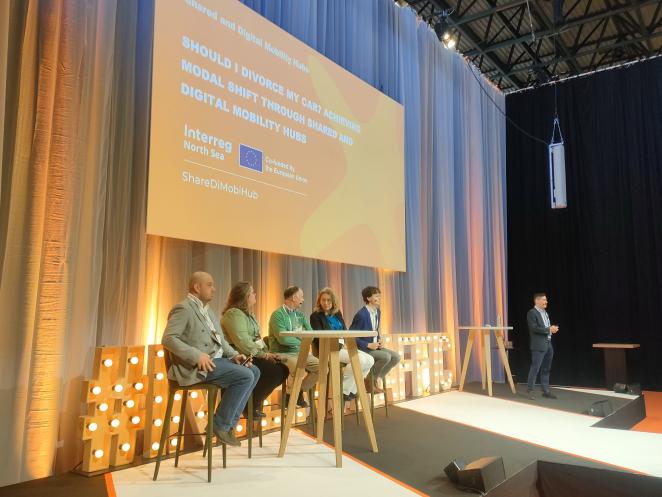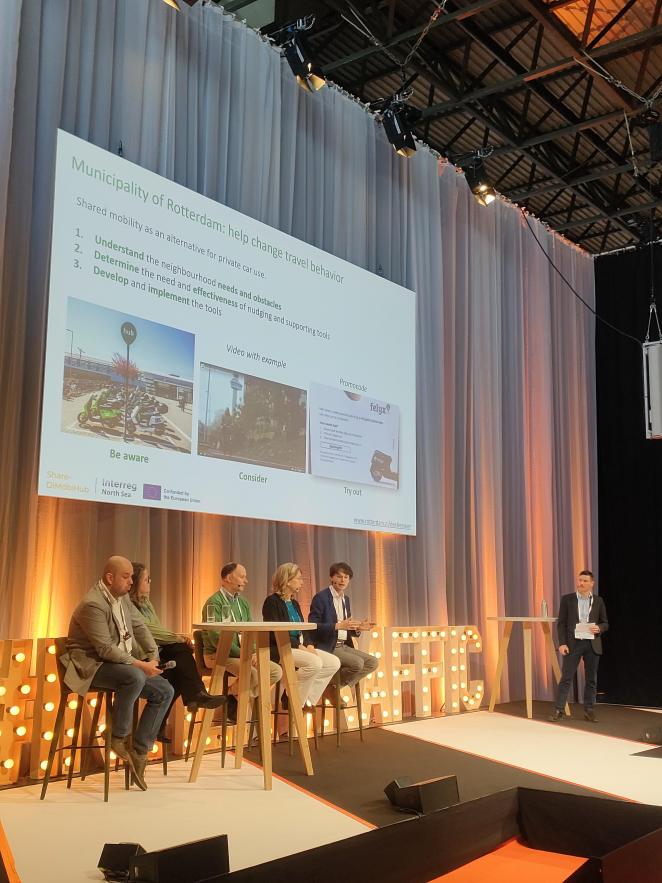ShareDiMobiHub was recently present at INTERTRAFFIC Amsterdam with a session on April 18, titled "Should I Divorce My Car? Achieving Modal Shift Through Shared and Digital Mobility Hubs. For those not attending, here is a small recap.

ShareDiMobiHub was recently present at INTERTRAFFIC Amsterdam, one of the global leading conferences on traffic management. With a session on April 18, titled "Should I Divorce My Car? Achieving Modal Shift Through Shared and Digital Mobility Hubs," our expert partners discussed how improving shared mobility policies supports a shift away from private car use while moving towards more sustainable options. The session, integral to the ShareDiMobiHub project, showcased different initiatives taken by our partners in their different municipalities.
The session opened with a detailed overview of the ShareDiMobiHub project's objectives by Daniel Herrera, from POLIS. The focus was on improving urban accessibility and liveability by integrating shared mobility hubs into city, metropolitan, and regional transportation systems. This introduction set the stage for an extensive examination of regional strategies and pilot programs.
Panel Discussion
The panel featured contributions from representatives across the North Sea Region, including the cities of Amsterdam, Utrecht, and Rotterdam, and the Vervoerregio Amsterdam (Transport Authority for the Amsterdam Region) and specialist partner MPACT. Each panelist presented their city’s or region's specific initiatives, achievements and remaining challenges.
The City of Amsterdam is advancing towards becoming emission-free by 2030 with strategies such as the Hubsvisie Amsterdam, which paves the way for research and the scaling of neighborhood hubs. As stated by her manager, Angelique Morcus-Akkerman, Amsterdam’s shared mobility policy encompasses a broad range of transport modes, including bicycles, mopeds, and cars, integrated. The city’s efforts are focus on upscaling neighborhood hubs to create a comprehensive citywide network that provide all these transport modes, emphasizing high-demand areas and underserved locations.
The Transport Authority for Amsterdam Region showcased the importance of providing a network at regional level by implementing 20 new shared mobility hubs with a range of shared vehicles, stressing the challenges it entails. Bram Nieuwstraten, Policy advisor for the Authority, highlighted how the efforts are centered on establishing a regional governance model that integrates shared mobility into a broader public transport strategy, including a digital infrastructure for data sharing between mobility providers.
Province of Utrecht Advisor Eric Van Dijk also stressed this point while aiming at leveraging its role to enhance connectivity between the 26 municipalities it encompasses. The province is focusing on aligning mobility enhancements with societal goals such as sustainability and liveability, aiming to foster a comprehensive regional shared mobility system
Mariet de Haas, coordinator of shared mobilityfrom the City of Rotterdam put the focus on how shared mobility also should target specific demographic groups to expand shared mobility usage and the efforts to do so. She expressed how the city is working closely to citizens to disseminate knowledge and develop targeted solutions that cater to the needs of these groups, aiming for a more inclusive approach to shared mobility.
Lastly, Jelten Baguet from MPACT discussed various initiatives in Belgium, attributing their success to the municipalities' willingness to embrace mobility innovations and include operators in decision-making. He also noted the importance of digitalising these services and integrating transport operators into coherent data frameworks, crucial for advancing the project's goals of efficient and inclusive urban mobility.

Closing Remarks
The session concluded with a synthesis of the discussions, stressing the innovative critical role of shared mobility hubs in achieving sustainable urban mobility goals. By focusing on collaboration, digitalization, and inclusive strategies, ShareDiMobiHub partners are setting a course towards a more sustainable, efficient, and accessible urban future to be followed by European Cities. Shared mobility solutions not only tackles immediate mobility challenges but also aligns with broader environmental and societal goals, promising substantial impacts on urban liveability across Europe.
As a result of the panel, our experts from the Province of Utrecht, Eric van Dijk, and Mpact, Jelten Baguet, were interview and featured an article on the INTERTRAFFIC website. Make sure to read it!
